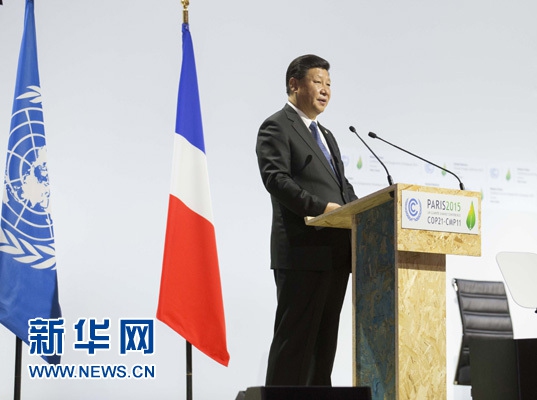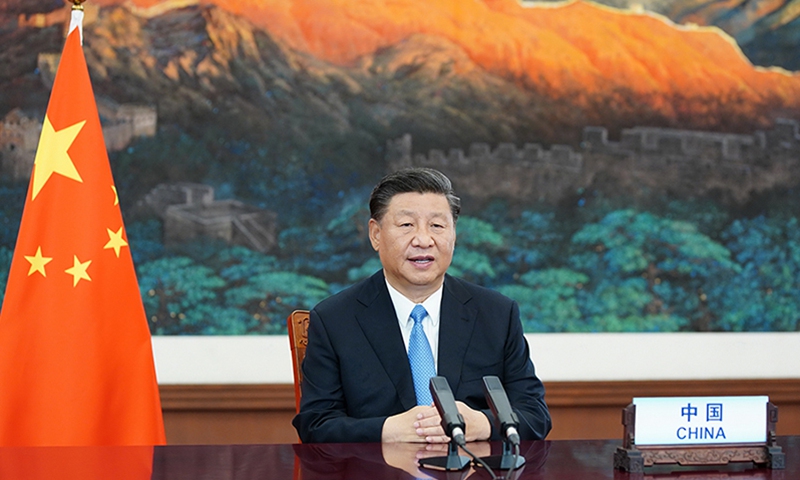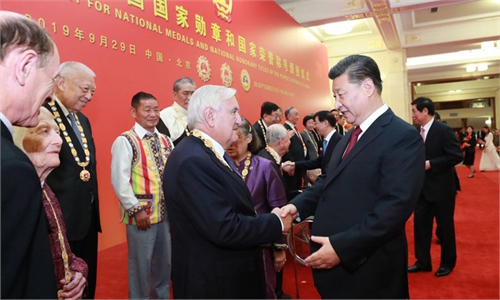
President Xi Jinping delivers an important speech titled “Work Together to Build a Win-Win, Equitable and Balanced Governance Mechanism on Climate Change” at the opening ceremony of the United Nations Climate Change Conference in Paris, France on November 30, 2015
Since 1995, the United Nations has convened the Conference of the Parties (COP) to the United Nations Framework Convention on Climate Change (UNFCCC) annually to pool global consensus on tackling climate change and pursuing sustainable development in post-industrial times. In 1997, the Kyoto Protocol was concluded after rounds of tough negotiations, aimed at limiting greenhouse gas emissions of developed countries. However, the United States refused to ratify the Protocol and Canada withdrew in 2011. At the 2009 Copenhagen Conference on Climate Change, there were deep divides between the developed and developing countries on emission reduction targets.
From November to December in 2015, the 21st Conference of the Parties to the UNFCCC (COP21) was held in Paris. At the opening ceremony, President Xi Jinping quoted an ancient Chinese saying that "All things live in harmony and grow with nourishments," calling on countries to strengthen confidence and work together to build a win-win, equitable and balanced governance mechanism on climate change. During the Conference, China actively coordinated policy positions with the United States, the EU and other major developed countries, and strengthened solidarity and cooperation among developing countries through the BASIC, the Like-Minded Developing Countries, the "Group of 77 plus China" and other groups in the negotiation.
The Conference concluded with the adoption of the Paris Agreement, which consists of 29 articles including goals, mitigation, adaptation, loss and damage, finance, technology, capacity-building and transparency. The document is an important legal basis for the global response to climate change after 2020. China's active efforts played a critical role in the conclusion of this historic document. COP21 President Laurent Fabius noted that whenever asked about the success of the Paris Agreement, he would stress that without China's active support, there would have been no Paris Agreement. In addition, China has also played an important role in terms of the Agreement's entry into force and implementation. It was among the international treaties known for their rapid entry into force. Nicholas Rosellini, UN Resident Coordinator in China, commended China's important role in implementing the Agreement and noted that China's leadership and commitment was crucial for achieving the goals.

Representatives celebrating the adoption of the Paris Agreement at COP21, December 12, 2015
Lucid waters and lush mountains are invaluable assets. China has set high and long-term targets for ecological improvement and made solemn commitments. Our actions are determined and achievements remarkable. According to the UN Food and Agriculture Organization report, from 1990 to 2020, while a total of 420 million hectares of forests were destroyed worldwide, forests and grasslands in China increased by 33 million hectares. Data from the United States National Aeronautics and Space Administration (NASA) shows that since the beginning of the 21st century, China has contributed 25% of the newly vegetated area worldwide.
China has contributed the largest share of the world's entire energy savings. It is now the No. 1 consumer of new and renewable energy, and its investment in clean energy has exceeded other countries for years in a row. Since 2000, there has been an eight-fold increase in the installed capacity of renewable energy in China. It is home to one-third of the world's solar power plants and wind power turbines, and half of the world's passenger electric vehicles. It is expected that by 2035, new energy vehicles will take more than 50% of China's auto market, of which 95% or more will be battery electric vehicles.

President Xi Jinping gives an important speech to the General Debate of the 75th Session of the UN General Assembly, September 22, 2020
These achievements are attributable to China's long-standing commitment to green development and its painstaking efforts to protect the environment. Ecological conservation has been inscribed in the Constitution of the People's Republic of China and the Constitution of the Communist Party of China, and ecological development has been identified as one of the priorities in the five-sphere integrated plan. In September 2020, President Xi Jinping declared at the General Debate of the 75th Session of the UN General Assembly that China aims to have CO2 emissions peak before 2030 and achieve carbon neutrality before 2060. China's commitment has helped facilitate the global response to climate change and stimulated global green policies. In March 2021, the 14th Five-Year Plan and the Long-Range Objectives Through the Year 2035 was adopted at the fourth session of the 13th National People's Congress. The document dedicated a whole chapter to "promoting green development and harmony between man and nature." In the post-COVID era, China will not only work with the rest of the world to take forward global economic recovery but also make even greater contributions to global climate governance.
The future of all things lies in nature. In October 2021, the 15th meeting of the Conference of Parties to the Convention on Biological Diversity (COP15) will be held in Kunming, China. Themed "Ecological Civilization: Building a Shared Future for All Life on Earth," COP15 will explore new approaches to protecting biodiversity and pool new consensus on the harmony between man and nature.
A sound ecosystem is essential for the prosperity of civilization. From Paris to Kunming, China has taken solid steps forward in advancing green development. Standing at the historical juncture where we have just completed the first centenary goal and are moving toward the second, we will continue to work with the rest of the world to explore a way for man and nature to live in harmony, and make the Earth a more beautiful place.



